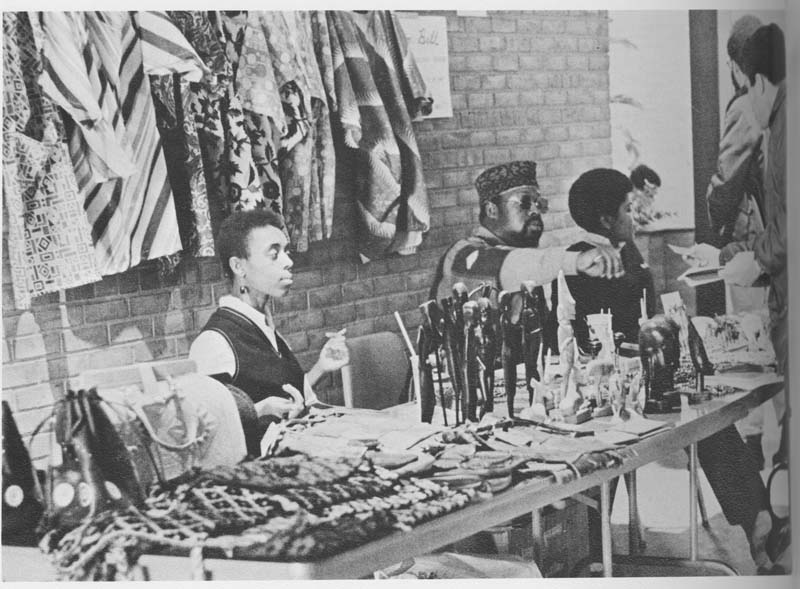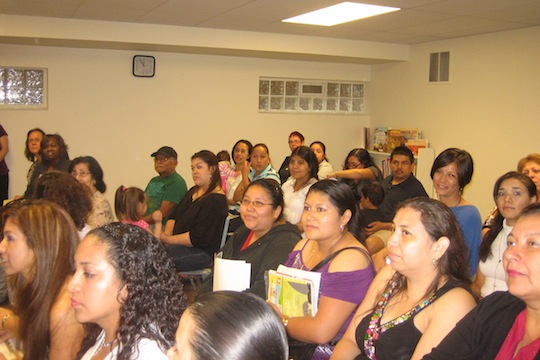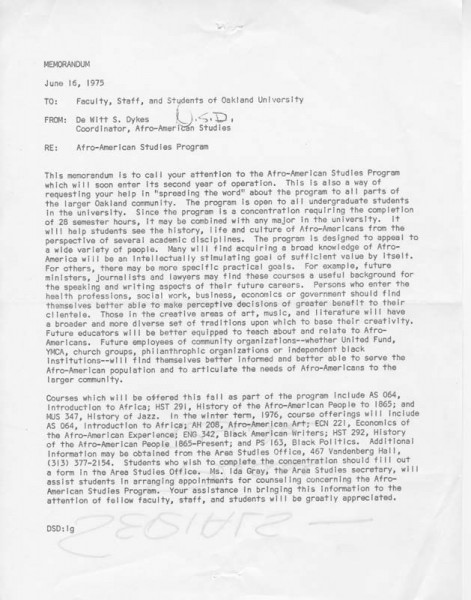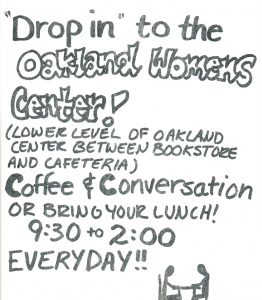Diversity at OU: 1970s
1970: Black students enrollment
The University Senate votes to increase black enrollment to 15% of the freshman class.Source: Minutes of the Meeting of the University Senate, May 13, 1970
1970: Coed living
In 1970, a proposal was put forward to encourage the creation of some coed living spaces in the existing student dorms. These spaces were planned to only house "hand-picked" students whose parents would know ahead of time they would be living in a co-ed space.1970: International Students and Scholars
 In July, the International Students and Scholars Office is established. As noted on its website, ISSO " is committed to building an international campus through service, support and advocacy to nurture global citizenship and multicultural appreciation."
In July, the International Students and Scholars Office is established. As noted on its website, ISSO " is committed to building an international campus through service, support and advocacy to nurture global citizenship and multicultural appreciation."
Image: OU International Students and Scholars Office
1971: Black Liberation Caucus
 In January, the Black Liberation Caucus is founded. According to the March 15, 1971 edition of OU, an official university newsletter, BLC replaces the Association of Black Students, as the "formal" organization for OU African American students. The article notes that BLC views itself as a "political organization linked with a world-wide liberation movement". In its general policy statement, BLC offers the following political stance:
In January, the Black Liberation Caucus is founded. According to the March 15, 1971 edition of OU, an official university newsletter, BLC replaces the Association of Black Students, as the "formal" organization for OU African American students. The article notes that BLC views itself as a "political organization linked with a world-wide liberation movement". In its general policy statement, BLC offers the following political stance:
The Black Liberation Caucus is dedicated to the liberation of black people and is guided by the principles of black revolutionary nationalism and pan-Africanism. We are committed to a struggle against racism, capitalism, and imperialism both in the U.S. and internationally, especially on the African continent.
According to a James D. Graham essay, "The Revolution Was Not Televised: Perspectives from the Banks of Beer Lake, 1969-1975,"(1) by 1974 BLC morphed into the "more inclusive" student organization: the Association of Black Students. However, a petition for recognition as a student organization indicates that ABS existed since early 1968. (See 1968 entry for Association of Black Students).(1) OU Journal, Issue No. 7, Fall 2004
Image: Oakland University Archives
1971: OU La Raza Day
 Oakland University Latin-American staff and students, in conjunction with the Admissions Office, sponsors the university's first "La Raza Day". La Raza Day is a campus visitation program, culturally oriented to Latino high school students. The goal of the program is to "promote cultural awareness and to explore the opportunities and facilities available in higher education for...Latino student[s]". The second annual La Raza Day is briefly mentioned in the April 18, 1972 Oakland University Newsletter.
Oakland University Latin-American staff and students, in conjunction with the Admissions Office, sponsors the university's first "La Raza Day". La Raza Day is a campus visitation program, culturally oriented to Latino high school students. The goal of the program is to "promote cultural awareness and to explore the opportunities and facilities available in higher education for...Latino student[s]". The second annual La Raza Day is briefly mentioned in the April 18, 1972 Oakland University Newsletter.
Image: The Hispanic Outreach Program
1974: Afro-American Studies Program
OU starts the Afro-American Studies Program, a concentration to "help students see the history, life, and culture of Afro-Americans from the perspectives of several different academic disciplines. In the memo below, Professor De Witt S. Dykes explains that the program, which requires 28 credits, is suitable to a wide range of students. Afro-Americans Studies (later combined with African Studies Program and renamed African and African American Studies) is currently a minor concentration in the International Studies Program .
Image: Oakland University Archives
.
Image: Oakland University Archives
1974: Black Alumni Association
The OU Black Alumni Association is established in June.1974: Women's Center

Image source: Women's Center, vertical file, Oakland University Archives
In June of 1974, talk first started about getting a Women's Center on campus. People felt that the center was needed to serve OU women and in the local community as well. There was concern over whether or not the center would be legal under Title IX, but coordinators of the Women's Center assured skeptics that it was. They reassured concerned members of the OU community that there was no desire to exclude men, and said some male students already had interest in the center in the summer of 1974. On July 22, 1974, the official Women's Center Proposal was drafted. The goal was to "serve women, primarily those returning to school after some interruption". The proposal went on to list the variety of services that were to be offered thorough the center: academic advising, counseling, files of resource materials on opportunities for women, and more. The importance of having a facility with all of these support functions was emphasized, as at the time, no other place on campus could fulfill all of the functions that the Women's Center planned to do. By January of 1975, the Women's Center opened in the Oakland Center, and less than a year later it was hosting talks on rape, lectures on sexuality, and film screenings.Photos courtesy of the Oakland University Archives.